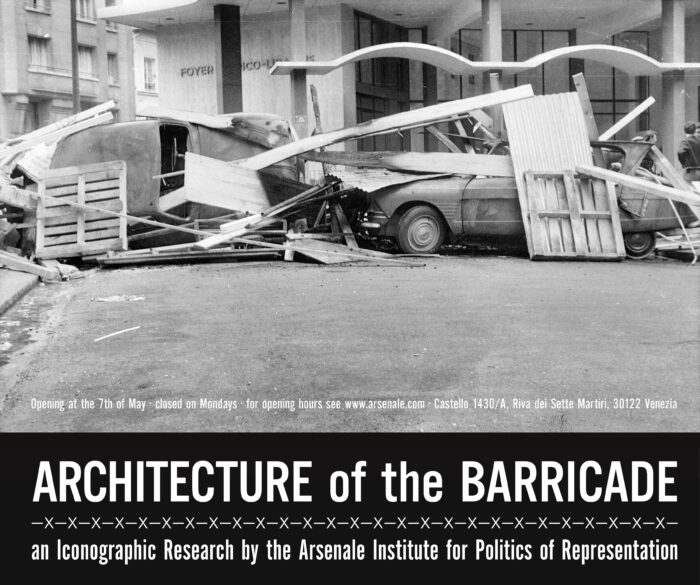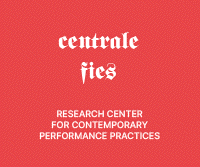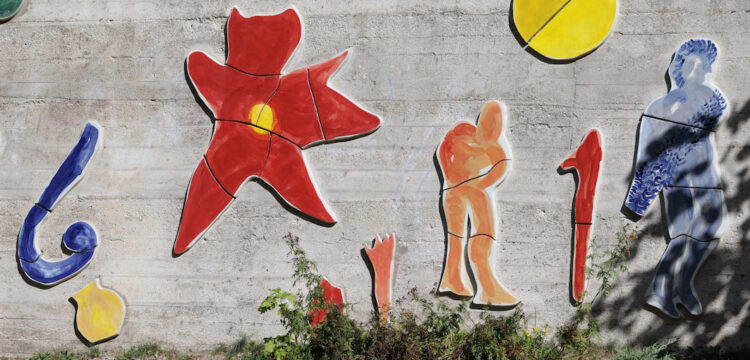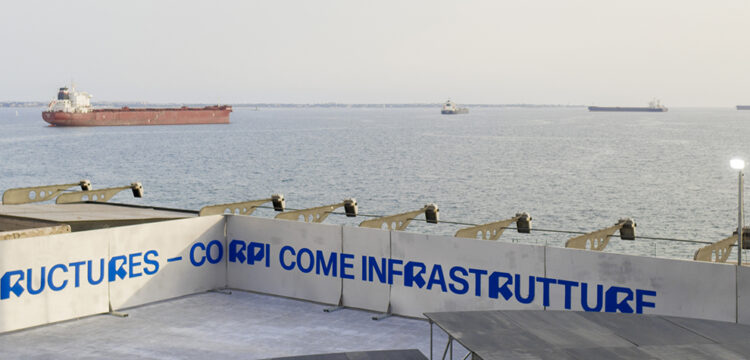All You Can Eat
Giulia Currà on Traslochi Emotivi
Traslochi Emotivi is a nomad company, each time reassembled and disintegrated through relations and meetings. From its very name (Emotional Moves), the act of moving—meant as moving houses, moving from one place to another—is at the core of the company’s practice, as concrete evidence of the unhinging of official History.
Traslochi Emotivi’s latest work, Deposta explores ideas of vulnerability, power and care relations, starting from the opposing assonance between the words deposta (deposed, deposited) and despota (despot, tyrant). On the occasion of Deposta’s second appearance as part of FOG Performing Arts Festival at Casa degli Artisti in Milan, we asked some questions to Traslochi Emotivi’s founder Giulia Currà, and here stand her answers.
Hi, my name is Giulia, I’m an artist and I’m trying to stop. I am used to telling secrets to strangers and I spend my days putting humans and non-humans under my skin so I never get any younger, training resistance pockets for my best and lovely friend Tutto (Everything). With Tutto we have been in a relationship for many years, we met in a warehouse among moving boxes, wrecks of strangers, shipwrecked memories, dead people’s stuff, porn divas, nobel prize winners, stuffed animals, dry biscuits, knives, sex toys, letters never sent, bones. It almost never bothers to make me decide what I want to find or fuck, it just comes at me, spits and sits smiling sideways watching my reaction.
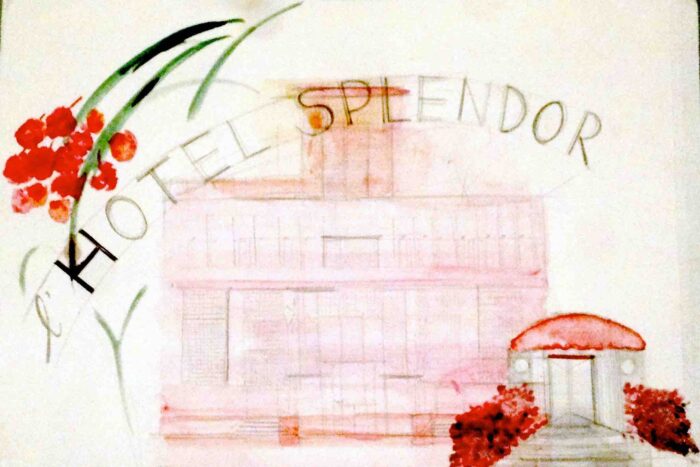
At a certain point, years ago, I simply decided to get along with it. I did it when I was 16, in London, waitressing at Daniela’s Lounge, with the 8:30am-lasagna-and-double-black-coffee lady. A beautiful woman I had fallen in love with: copper-coloured hair, dry purple lipstick, blue nails greasy from the chips she hid under the table, black liner over her eyes, four full bags between her legs, fixed gaze staring at the window, a spoon to eat as fast as possible, patchouli perfume and the risk that she would never pay. The last morning I saw her, she left a note on a napkin, folded beneath a gravy spoon: If you move something happens ; ). It has remained the tired refrain of my life. As soon as I risk the edge of oblivion I start singing it and I fall in love all over again. I never have anything to lose, the love for things and people is the only thing I believe in besides poetry, but maybe they are the same thing.
—
Traslochi Emotivi was born in a former fascist brothel in Settebagni, on the Via Salaria, in the traffic of memories, cats and wolves’ stone-heads hanging on the wall. The Traslochi Emotivi are parricides. They are inextricable clots of repeated stratifications with which I have opened hotels, customs, restaurants, museum exhibitions, sheds, perfumes, fairy tales and poems to liberate my memory from any trace of family. Traslochi Emotivi is made up of living and dead families, loves and affections that participate with their own authorship, so that I can continuously invalidate my own.
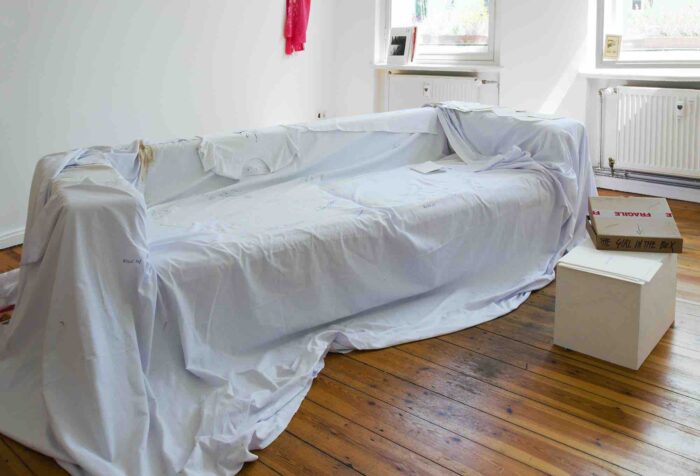
The Traslochi Emotivi are devoted to that sticky layer of dust to be left, wet, clean and dry, to a deafening noise, to brown scotch, to boxes, to vans, to the smell of petrol and tomato, to worn out paper, to postcards already sent, to details lost in pockets, to the untranslatability, the dark, the shiny, the plenty of bees, mosquitoes, wild plants, the five o’clock in the morning, the broken alarm clock, street queues, cigarettes in cars, changing tires, a shattered back, black nails, blankets, belts, the sauce. The Traslochi Emotivi are in perpetual gestation, accommodated between sofas, cargos or barges. They never give up and continue to imagine themselves in abandoned warehouses where the ferryman daily cares for their disturbing weight, leaving the burden of forgetting or laughing about it with the wreckers.
—
During funerals, children often stare in disbelief at the adults’ reactions, or play, or unexpectedly shout: Yay! I have always found the union of opposites very attractive. Elegant dispossession. My best and lovely friend Tutto lives to mess up my plans or to give me gifts to cultivate this obsession of mine. Among the 2022 gifts came an encounter with the Venice Luggage Deposit in Venice, a studio home of three wonderful fairies, Viola Morini, Giacomo Giannantonio and Giulia Wetter. Wood, shelves, flower cakes, temporary tattoos, diamond butterflies, a creaking cellar and a courtyard with ten meters long candles. I would have lived there…
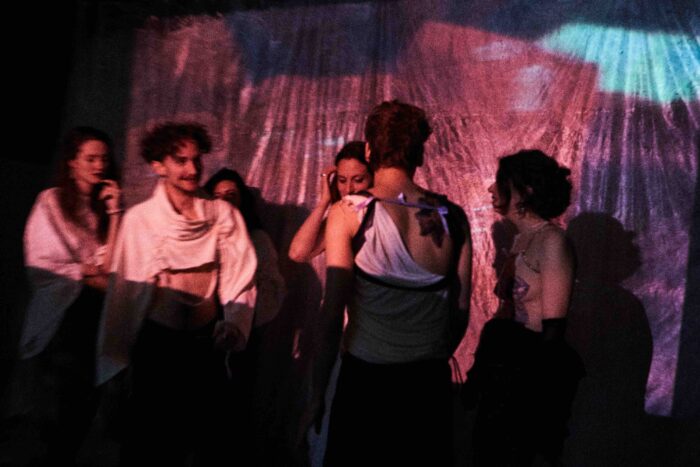
Deposta, Despota, Deposta, Despota, Deposta, Despota, Deposta, Despota, Deposta, Despota, Deposta, Despota, Deposta, Despota, Deposta, Despota, Deposta, Despota, Deposta, Despota, Deposta, Despota, Deposta, Despota, Deposta, Despota, Deposta, Despota, Deposta, Despota, Deposta, Despota, Deposta, Despota, Despota, Deposta, Despota, Des…
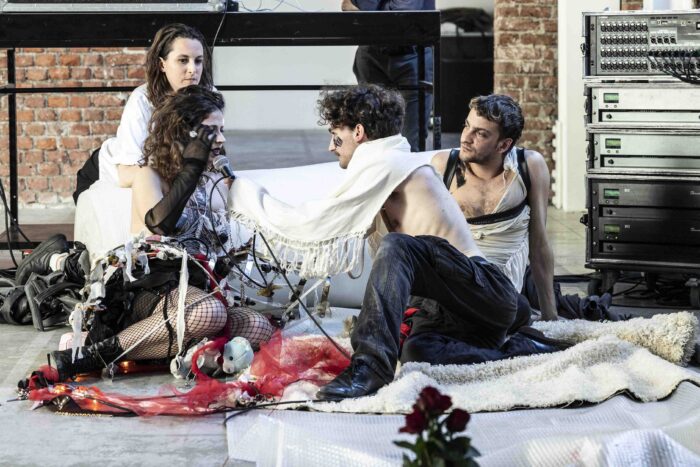
Give me a break! my best and lovely friend Tutto exclaimed one day. Give yourself a break! Do it there, in a Depot, in front of everyone’s eyes. Search among the ashes of the dead outcasts and hierarchs, the memory of suitcases, the depositions of the 1600s, and then ascensions, eye-shines, scattered coloured glass, plastics, air pockets, publications in progress, hidden video projections! Inhabit this unbearable tongue-twister with them—I can’t stand you any more!—Ahah, Tutto, you, touchy ; ) I love it when you get pissed off. And so Deposta was born. There were Alice Minervini and Francesco Corsi on the stage, Thomas Valerio on the memory, Giulia Currà on the opera libretto, Giorgiomaria Cornelio and Sasha Piccione on poetry and network research… We all turned a depot into the cradle of our fractures, and then straight to the next appearance with the seat belts fastened, eager for more doubts and cuddles.
—
We arrived at FOG performing arts festival as undercommons. Tutto, my best and lovely friend, was very happy, he was fond of Deposta. He thought about the depot and lived his dispersion of moods by inflaming the few days available to us to feed our desires. Between coffee and viruses, we experienced the threshold as guerrilla territory to transform weights into poetry. We have trafficked in packing materials, we have crossed phantom duets with Francesco Corsi’s mere thing, the Calabrian pakkiana, Alice Minervini’s erotic body as party, Thomas Valerio’s delayed and layered video memory, sound paradoxes, murmured silences and tinnitus by Nicola Ratti, the reactivation of residues and encrusted matter as a surreal scene with Viola Morini, Anna Cicero’s and Giulia Wetter’s costumes, and Mackda Ghebremariam Tesfaù’s critic text.
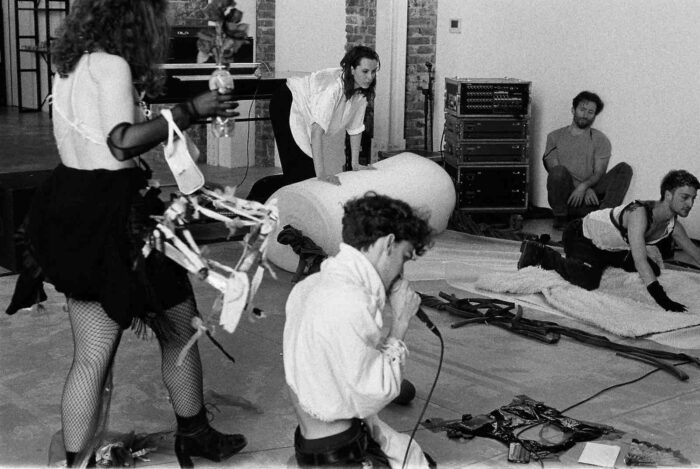
“Stratification and spatialisation are the two elements that intertwine in the world-translation. He who moves what does he leave behind? What remains in those who move of what they have left behind? Is it possible for what has been left behind to become an object of love again? Or will it remain for ever uninhabited, misplaced, deposed matter? These questions are not so much the result of philosophical speculation as questions rooted in a concrete historical movement, that of internal migration from southern Italy. A displacement, forced, which makes moving a compulsory choice, a condition of life, and in some cases a profession. The reference to the Southern question and to the unequal relationship between northern and southern Italy is made explicit in the choice of naming the deposta ‘Pakkiana,’ from ‘Pacchiana,’ a female costume in the Calabrian peasant tradition, and by translation a figure of popular representation. The Pacchiana/Deposta represents the subaltern-internal, in a dialectical reinterpretation in which servant and master give way to deposta and despot. This reinterpretation spatialises the relationship of domination and dependence by placing the theme of mobility at the centre. Mobility, emotional and physical, makes the move a process within which it is possible to subvert roles, to depose the despot and find a place for the deposed. In this process, sedimented objects return to love, no longer signs of the domination of an unresolved past, but matter of new possibility.”
—
“And the signs will be the daily instruments and the signs will be signs of mutes who can speak without possessing the mastery of speech. I disown the descendants ‘in the name of the father’ but I live with them in the reverberations, without attempting to reconstruct. I cannot be guardian and priestess of their graves. As inexperienced I assert myself in mockery to bring to light a weak body that is still able to look backwards at the aberration of its becoming. And I abandon the dear things because my life is lacking. I myself, as well as a false and comb-over poet, speak of myself without fear of God, and belong to the damned race of the sexless. My charnel house is multiplicity that will continue to see wolves and to howl misunderstood voices. I repeat to myself to abandon hate, to abandon the recognisable as source of existence, and to embrace the possibility of the Nameless. GIOVEDÌ GNOCCHE & SABATO DANZA MACABRA!”
—
A girl stood on a pedestal: white shoes, blue trousers, white T-shirt, hair down and a microphone in her hand. Straight out into the deserted landscape, she waited for the friends who were to bring people to her much-prepared first public outing. To release the tension, she had begun to chant words and letters out loud. Every now and then she stretched her legs and hands. Meanwhile, he waited and with a few sips of water he settled down. Everything was ready. Just her and that pedestal. The lake was waiting, the grass too. The supermarket was closed and a broken light flickered just ahead. With every sound made, the fog shifted, a fish changed direction and mosquitoes passed between dry threads under the now blazing lamp. She waited. Then she took the microphone, passed it between her thighs, felt enjoyment and fell asleep. When she woke up, still no one was visible on the horizon. So she got tired of being alone, abandoned the pedestal and the microphone, took the water and the instruments and left. After a few minutes, her friends arrived and applauded the empty pedestal, writing messages of love and compliments to her. She first cried and then could not stop laughing. To this day, abandoned pedestals have been found in several countries. The estimate is a few million euros each. She has never reappeared. Friends keep on writing to her. She just reads and laughs.
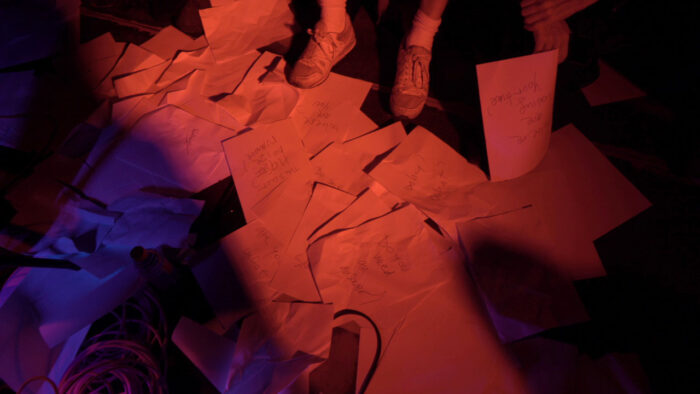
Notes: Deposta 03, opening of Casa Cicca Museum in june, publishing a book, drinking lots of water/rhubarb-spritz, getting Vegetal Import Festival for adoption, killing the patriarchy, growing inclinations, stealing and not getting caught, finding the blue princess, transforming tears into magic potions, writing with Gilda Von Rumelin, and all lived happily ever after. Love xxx If you move something happens


